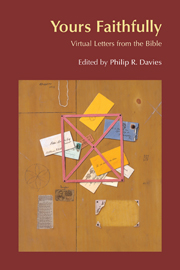Book contents
- Frontmatter
- Contents
- INTRODUCTION: IN PRAISE OF VIRTUAL LETTERS
- 1 Sarah to Abraham
- 2 Isaac to Abraham
- 3 Sarah to Rebekah
- 4 Pharaoh Ramses to Moses
- 5 Aaron to Miriam
- 6 Jephthah's Daughter to her Father
- 7 Samson to Delilah
- 8 Shmuel ben Elkanah to Achish
- 9 Absalom to David
- 10 Salu Father of Zimri to Zur Father of Cozbi
- 11 Ahitophel to Absalom
- 12 Ahitophel to Eliam, his Son
- 13 King Ahab to his Steward Obadiah
- 14 King Ahab to the Writers of the Books of Kings
- 15 Athaliah to Elijah the Tishbite
- 16 The Big Fish to Jonah
- 17 Nineveh to Judah
- 18 Jeremiah to Ezekiel
- 19 Between Zedekiah and Jeremiah
- 20 Haggai to Zechariah
- 21 Zechariah to Haggai
- 22 Esther to her Mother
- 23 John the Baptizer to Jesus
- 24 Jesus to his Mother
- 25 Judas Iscariot to James; James to his Family
- 26 From a Greek Woman of Tyre to Jairus of Galilee
- 27 Pilate's Wife to her Husband
- 28 Publius Philostratus to an Author
- 29 Onesimus to Paul
- 30 ‘Jezebel’ of Thyatira to John of Patmos
- 31 Letter to Bible Authors [Draft]
- List of Authors
28 - Publius Philostratus to an Author
- Frontmatter
- Contents
- INTRODUCTION: IN PRAISE OF VIRTUAL LETTERS
- 1 Sarah to Abraham
- 2 Isaac to Abraham
- 3 Sarah to Rebekah
- 4 Pharaoh Ramses to Moses
- 5 Aaron to Miriam
- 6 Jephthah's Daughter to her Father
- 7 Samson to Delilah
- 8 Shmuel ben Elkanah to Achish
- 9 Absalom to David
- 10 Salu Father of Zimri to Zur Father of Cozbi
- 11 Ahitophel to Absalom
- 12 Ahitophel to Eliam, his Son
- 13 King Ahab to his Steward Obadiah
- 14 King Ahab to the Writers of the Books of Kings
- 15 Athaliah to Elijah the Tishbite
- 16 The Big Fish to Jonah
- 17 Nineveh to Judah
- 18 Jeremiah to Ezekiel
- 19 Between Zedekiah and Jeremiah
- 20 Haggai to Zechariah
- 21 Zechariah to Haggai
- 22 Esther to her Mother
- 23 John the Baptizer to Jesus
- 24 Jesus to his Mother
- 25 Judas Iscariot to James; James to his Family
- 26 From a Greek Woman of Tyre to Jairus of Galilee
- 27 Pilate's Wife to her Husband
- 28 Publius Philostratus to an Author
- 29 Onesimus to Paul
- 30 ‘Jezebel’ of Thyatira to John of Patmos
- 31 Letter to Bible Authors [Draft]
- List of Authors
Summary
Lux Gentilibus Publishing
Villa Industria
Via Omnis Carnis
Roma
Dear Sir,
Thank you for submitting your manuscript, ‘The beginning of the Good News’, to us for consideration. I am sorry that we have taken so long to respond, but I am now able to tell you the outcome of our deliberations. We solicited a reader's report, which has now been received, and I will now communicate to you the gist of the remarks and recommendations made to us.
Your work shows great promise, but also some signs of immaturity. This is often the case with an author's first effort. You have chosen an interesting topic: a religious reformer (actually, he seems like a peripatetic Cynic to us) who antagonized the authorities in Jerusalem and was ultimately executed by the procurator. This is admittedly not an unusual occurrence nowadays, especially in that part of the world, but we understand that this man still enjoys a wide popular following and potentially there is a good market for this particular work. We are informed that his cult continues to spread.
However, we are unable to accept your manuscript as it presently stands. In the first place, it needs a much better beginning and ending. The main character appears very suddenly (though not even at the beginning), and we are told nothing of his birth or childhood, where he came from and how he started his career. These sorts of details are traditionally provided in tales about holy men, and our readers find them fascinating.
- Type
- Chapter
- Information
- Yours FaithfullyVirtual Letters from the Bible, pp. 137 - 140Publisher: Acumen PublishingPrint publication year: 2004



